EXTRA MATERIAL
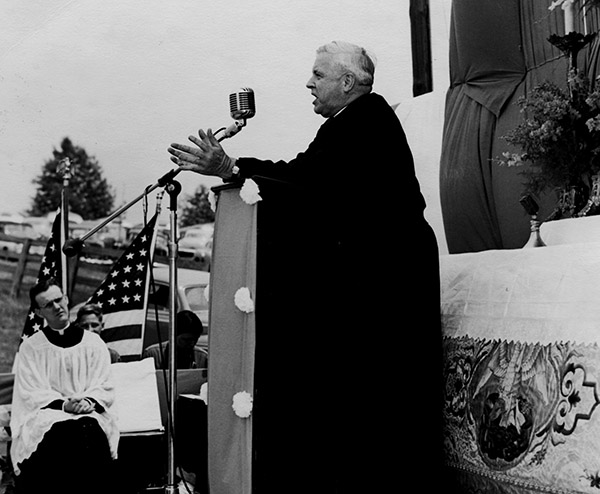
The Answer to the Problems of the World
Chapter Twenty-six - 1947-1948
Years of Struggle
A Story Told by Daniel Lord
Reduced to the Depths
My handwriting is of course proverbial among my friends. Just none of them—well practically none of them—can read it.
But the ultimate in insults arrived in a letter from a good friend:
“I sent a scrap of paper with your handwriting on it to a sister. I added, ‘Of course you can’t read it.’
She answered promptly: ‘Oh yes; I can read it. I teach kindergarten.’”1
Pamphlets of 1947
Lord kept working hard. He wrote 20 pamphlets in 1947, twelve of which were novenas. Eight were regular pamphlets:
All Souls Novena
Immaculate Conception Novena
Infant of Prague Novena, Little Flower Novena
Mount Carmel Novena
Our Lady of Fatima Novena
Our Lady of Lourdes Novena
Sacred Heart Novena
St. Anne Novena
St. Anthony Novena
St. Joseph Novena
St. Jude Novena
Catholic Education Is a Waste?
Laughs from a Lecturer
A Mother Looks at Birth Control
Politeness in the Pews
Romance Is Where You Find It
St. Peter: Pope or Imposter?
Spinsters, Are Wonderful People
Christmas with Mary
The first of three pamphlets Lord wrote on church manners, Politeness in the Pews provides a fascinating look at church etiquette, or the lack thereof, in the 1940s. Lord starts by describing one of his favorite movie producers: Pete Smith. Pete Smith produced comic shorts: each one called a Pete Smith Specialty,
Written by a Smith named Pete.
Lord recalls the film Movie Pests. Lord speaks of pests in church.
[If you need a break from reading this book, pull up a Pete Smith Specialty on YouTube.] Lord also wrote Pete ‘Speciality’ Smith: An Interview by George Douglas
for the December 1947 issue of The Queen’s Work.
In Politeness in the Pews, Lord talks about everything including how to use holy water and make the sign of the cross. He laments the problem of empty front pews and filled back pews which no room for the latecomers. He discusses proper genuflection and the problem of the ‘bobber’ and the ‘deep dipper.’ He describes the ‘end-seat hog’ and problem of women’s large hats and hats with veils at communion.
Lord wants people to arrive on time, early enough to get settled before the service starts. He complains of those who stand in back so they can leave early. He notes that theater audiences stay to applaud, instead at mass: I have sometimes turned as I walked from the altar to the sacristy and seen my congregation presenting to me a solid bank of backs. . . . They dashed out before I left the sanctuary, jamming into the aisles and piling out as if someone had suddenly called out, ‘air raid!’ I don’t like it. I doubt that God likes it.
2
As for confession Lord complains of line cutters. He also notes:
I will of course gladly hear the confession of anyone at any time; but I offer it up as one of my major penances when a penitent breezes into my dark and not-too-well-ventilated compartment the emphasis of freshly gathered onions, the smell of not-too-good whiskey, the reek of stale tobacco, or the enthusiastic rehearsal of recent garlic.3
Lord talks on manners in coming up to kneel at the communion rail. Finally, writing in the days when priests put the host on the tongue of the communicant, Lord gives several points of guidance.
Each Catholic might well study before a mirror the position in which his tongue should be to receive Holy Communion. Some people put forward the daintiest little peninsula of tongue, utterly inadequate to offer a solid resting place for the Host. Others manage somehow to lift their tongues into a round hump, a position that imperils the Host. Still others thrust their tongue so far forward that the priest is confronted by an unnecessary and unexpected view of palate and tonsils.4
Ultimately in this pamphlet Lord teaches Catholics how to be better Catholics.
Alcoholics Anonymous
In 1947 Lord published Alcoholics Anonymous, an interview with Edward Dowling, S.J., by Frank A. Riley. Dowling was an important influence on Bill Wilson the founder of AA. The Eleventh of the Twelve Steps states: 11. Sought through prayer and meditation, to improve our conscious contact with God as we understand Him, praying only for knowledge of His will for us and the power to carry that out.
Dowling provides a list of pamphlets, mostly by Lord, to help a person follow this step:
1st Step—I Can Take It or Leave It
Who’s Pushing Your Mind Around?
2nd Step—Atheism Doesn’t Make Sense
The Happiness of Faith
3rd Step—Is Religion Bad for You Mind?
Has Life Any Meaning?
4th Step—Are You Scrupulous?
5th Step—When We Go to Confession
Confession is a Joy?
6th Step—The Invisible Standard
7th Step—How to Make An Act of Perfect Contrition
by Leo T. Dowling, S.J.
8th Step—What of Free Will?
9th Step—Of Course We Don’t Mean You
10th Step—Examination of Conscience for Married Couples by Edward C. Haungs, S.J.
11st Step—Prayers are Always Answered
12th Step—How to Stay Young
In Catholic Education is a Waste? Dick and Sue are away at Catholic College. They started college in 1932 but like many fictional young people, e.g. Bart and Lisa Simpson, they never age. This pamphlet covers some of the same points as Lord’s 1931 pamphlet Murder in the Classroom.
This is another pamphlet were Lord shows himself to be ‘The Great American Catholic Salesman.’ Father Hall joins the Bradley parents at the Lakeside Country Club: And I’d say that a country club is far and away a harder mission field than the African bush or a Chinese slum.
5
Father Hall makes an eloquent defense of the value of sending young people to Catholic colleges and universities rather than state or private universities. Many of his arguments are still relevant today. Father Hall also notes that many private universities have quota limits on the number of Catholics, Jews, and Negroes accepted.
In Laughs From a Lecturer Lord relates anecdotes about his public speaking. At one program, the Toastmaster was ready to launch into a long introduction of Father Lord. An usher came up and handed him a note. He blushed and read: From the ravings of the toastmaster, O Lord, deliver us, Father Lord.
6
Once at a banquet everything was going well, the crowd was having a good time. The organizer turned to Lord, the guest speaker: Well, father, I think we are about ready. Shall we let them go on enjoying themselves a little longer, or will you talk now?
7
In A Mother Looks at Birth Control: A Letter from a Mother to a Priest Lord admits that after his three previous pamphlets on birth control he received many letters including ones with comments such as Why do priests keep harping on the subject all the time?
and Anyhow what can an unmarried priest know about the problems of married people?
8 He admits he has listened to many people in the confessional and points out that a doctor does not need to have cancer to be able to cure it.
9
When he received a letter from Margaret (Peggy) Theresa Boyan he decided to publish it as a pamphlet.
In a letter to Father Lord a mother of three small children gives an irrefutable answer to the birth-control hawkers: the happiness of a family—husband, wife, and children—whose keynote is wholehearted, unselfish cooperation with the Son of the Holy Family.10
Peggy does not give theoretical arguments on birth control; rather, she simply talks her about husband and children. (Her husband had gone to the Pacific during World War II.) She talks about the joy of having her family despite all the struggles.
Romance is Where You Find It
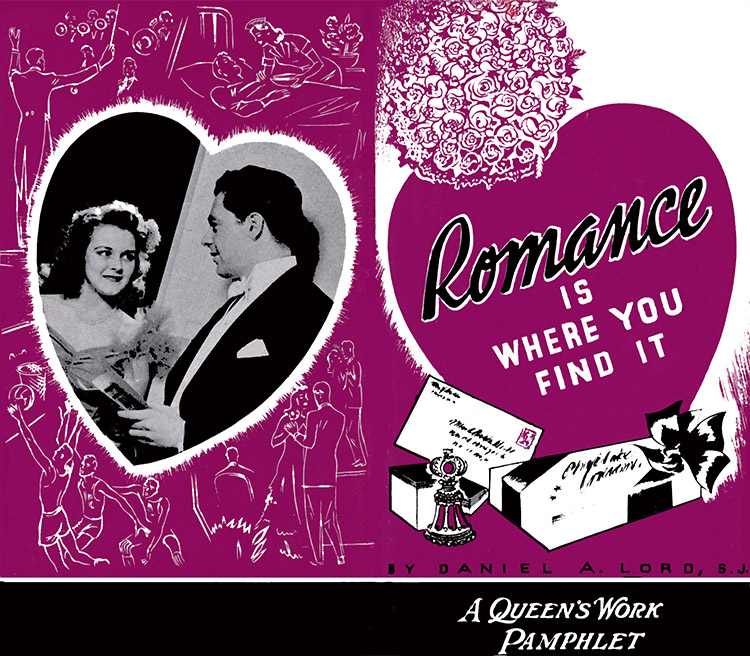
In Romance is Where You Find It Father Hall, in talking to the Bradley twins, laments the concept of romance and the fact that people marry for romance. Romance is to those of your years what fairytales are to little children, I suppose.
11 It’s all part of the world-wide conspiracy. Romance! the great thing in life! It’s the slogan of half the entertainment rackets in all the world today.
12
This helpful pamphlet tries to get young people to understand the difference between romantic infatuation and true love. Father Hall is the mouthpiece for Daniel Lord’s own experience of hearing many young people’s stories about missteps in deciding to marry. As Father Hall states:
A little less infatuation before marriage and a lot more companionship and trust and affection and friendship after marriage—with God’s blessing on a wise as well as beloved choice—that, I honestly think, is the way to happiness that I pray.13
M. Scott Peck in his The Road Less Traveled would later work out in detail this distinction between real love and romantic love and how not understanding the difference has created much heartbreak.14
The writing of St. Peter: Pope or Imposter? was inspired by letters and lectures from Protestant ministers who denied the role of Peter as the first Pope. Lord posed the questions: Peter—Pope or imposter?,
and Peter—just another Apostle? or leader and prince of the Apostles.
Lord does a very thorough survey of all Gospel references to Peter. Not surprisingly, he concludes: That is the story of the Peter as the Gospel tells it. To me it is a convincing story, beautifully integrated. The argument remains beyond contest.
15 Obviously, there are important questions about how to interpret Matthew 16:18-19 and the complex historical development of the bishop of Rome as the Pope that were not part of Lord’s training.
Pamphlets of 1948
Are You a Well-Balanced Person?
Dear Grad, Every Parish Has Them, How Our Lady May Have Looked
I Was Going Steady
In-Laws Aren’t Funny
Life
and Look
Show Us Communism
Is Love All That Matters
My Grandfather Was a Minister
Success for the Taking
What Catholics Think of Christ
What Catholics Think of the Church
Your Split Personality
A Star, A Child, and a Stable for Christmas
I Was Going Steady
A True Story With or Without a Moral . . . Depending on Your Point of View is a quaint story, told by an old-timer, set during the time of Lord’s youth. The man talks about falling in love at 18. He belonged to a Social Club of ten boys and ten girls. They would do ten events but would draw names so each boy took each girl to one event during the season. The idea was to have fun and not get too serious. However, the man falls for Julia who is out of Social Club. He misses the fun of the Social Club and in the end Julia goes back to her old boyfriend Bill.
More that anything this pamphlet is a window into a certain type of middle class life in the early 1900s when Derby’s were the hat of style. It is hard to now how much of this story reflects Lord’s actual life, but there seems to be a lot of overlap: a parish dramatic club, Catholic college, a respected priest at the college, and mother concerned about proper behavior. As for old-timer in the story, he wound up marrying Julia’s younger sister, Grace.16
The title In-Laws Aren’t Funny comes from Lord’s day when for some radio, and later TV comedians, mother-in-law jokes were their bread and butter. Her Lord gives more practical and straightforward advice for married couples about dealing with in-laws. He helps people think about the proper boundaries for in-laws so they do not undermine marriages. This pamphlet is worth reading today.17
Lord published Life
and LOOK
Show us Communism in 1948. He reprints two articles: Portrait of an American Communist
by John McPartland, Life (January 5, 1948) and Does Communism Threaten Christianity
by Dorothy Thompson, LOOK (January 20, 1948). (Thompson’s second husband was Sinclair Lewis.) This pamphlet does not have an Imprimatur.
Lord offers the articles to show that voices other than the Catholic Church are speaking out against communism. He summarizes the Catholic view:
The Catholic Church cannot do otherwise than despise a philosophy that sees man as only an animal, a machine, a robot of an all-powerful state. Catholics can have no truck with the slavery of the police state that is the petdemocracyof the totalitarian whatever his shade and nationality. Catholics believe that the goods of God’s earth belong to God’s children and are not to be taken from them and placed in the control of a complicated power-greedy bureaucracy.18
Is Love All That Matters?
Is Love All That Matters? is another straightforward pamphlet by Lord that describes the difference between romantic love and real love. Yet romantic love was being held up as the ideal in numerous movies and novels in Lord’s days, as it is now.
The preoccupation with romantic love, the conviction thatif I miss this love, I shall never know another,rests on a strange fallacy. Somewhere in relatively recent times there grew a notion that two specific people were made for each other, these two and these two only. Marriages are not confirmed in heaven through the sacrament of Christ’s institution; marriages are arranged in heaven. It is as if definitely assigned Angels equipped with filing cards place in a certain bracket the cards of John and Jane . . . and if for some reason John and Jane do not hit it off on earth, the angels have to tear up the cards and call off any possibility of Jane’s and John’s ever marrying anyone else.19
This pamphlet on the pitfalls of not seeing romantic love as a quick flash of fascination
makes worthwhile reading today.
First published as Love’s All That Matters, the title was changed to Is Love All That Matters?. It would sell almost 137,000 copies by 1963.
My Grandfather Was a Minister is Lord’s charming account of his relationship with is paternal grandfather after whom he was named, a ruddy-faced gentleman with Lord Dundreary whiskers.
20
Written in the wake of World War II, Success For the Taking: . . . Winning Careers gives general advice but does not name specific careers options. Lord had written the pamphlet How to Pick a Successful Career in 1935.
In Success For the Taking Lord suggests that young people take a personal inventory and look at their interests, hobbies, and strengths. He encourages thinking about the new international World, the Social Age (being socially responsible) and service to others. Lord describes his vision of the future:
It is not merely a matter of replacing what war has destroyed—though that in itself should be a challenge to young men and women. But new and better cities must be built. Slums and tenements must disappear forever. Cities must open their arms and their highways to receive light and sun and air. Country towns must lose their ugliness, must advance toward beauty. The age of pioneering is over; the ramshackle farmhouse and the miserable flat-faced city dwelling must become a thing of beauty, a place where men can live surrounded by comfort and peace and the refinements of art.
The call of business and industry today is, not a call to money-makers, but a call to men and women who will produce and make available to more and more of the earth’s people more of the good things of the earth.21
Dear Grad . . .
Lord wrote Dear Grad . . .
: A Booklet to Take Along Into Life it was later reprinted as So You’ve Graduated . . . What Next? Lord admits that students typically do not listen to graduation speeches. If he were to give one, it would be very short and he would then hand the students this pamphlet for later reading. Dear Grad begins with Lord recalling his own years at St. Ignatius high school/college.
Lord then gives detailed advice to a Catholic student finishing high school. He strongly recommends a Catholic college: The perils of a non-Catholic college are deep and multiple.
22 Lord encourages finding a career that one likes and then doing good work: Oddly enough work that we try to do well becomes work that we like.
23
In 1948 Lord saw a changing world:
We are entering an age when social thinking will have its effect on human living. The Holy Father’s cries for justice are being heard. Men are coming to realize that they cannot live by the exploitation of their fellows. The laws are more and more for the poor and the weak. The unions grow in power and honesty. More care is given to health. You have a chance to live twenty years longer than your grandparents lived. No one, it is true, will be able any longer to amass a great corrupting fortune—but few people will be allowed to starve.24
You are challenged to take your place in the amazing era that is opening.
You are dared to use the scientific achievements of that age to advance the cause of human happiness and of God’s truth.
You can play an important part in the one world toward which mankind is irresistibly moving.25
Of course, Lord suggests the reader consider being a priest or a nun or a brother. Lord gives advice on marriage including the value of marrying in a virginal state. Lord had strong views against mixed marriages with non-Catholics. He even recommended that unmarried people only associate with Catholics.
After giving religious guidance, the pamphlet ends with prayers to Jesus and Mary.
Pamphlet Graphics in Color
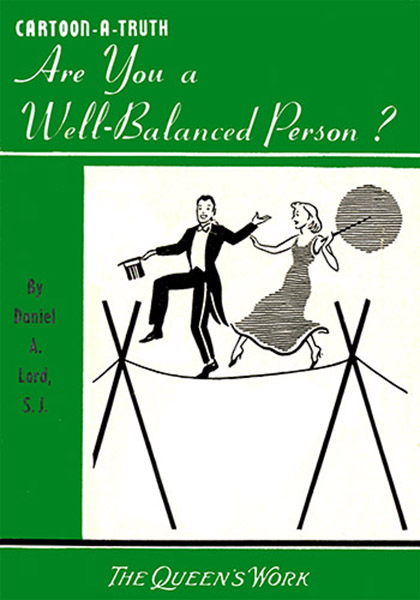
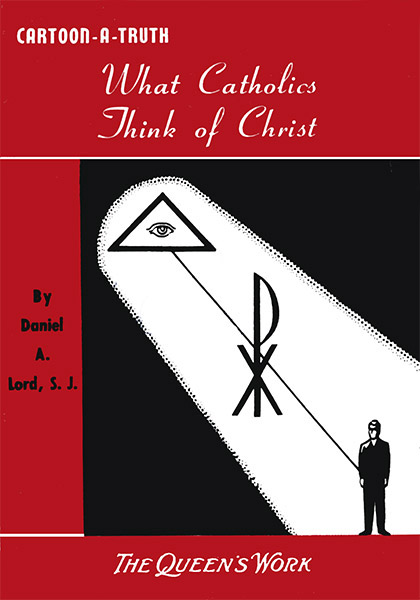
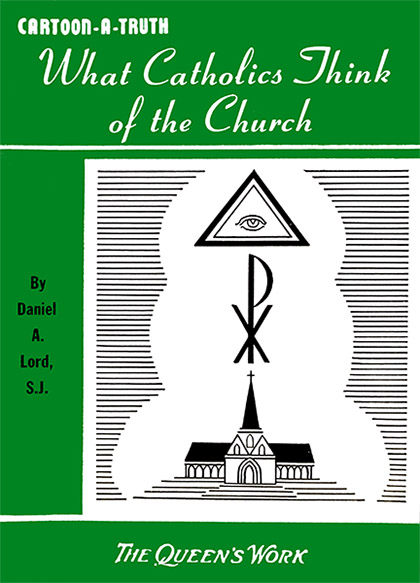
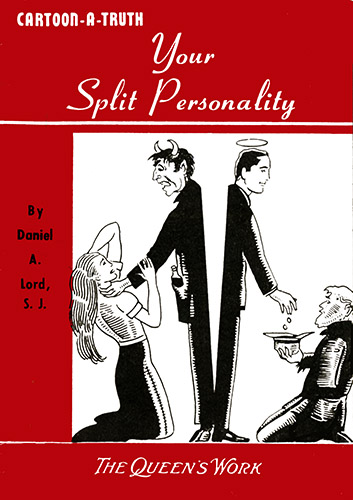
NOTES
- 1 That Made Me Smile, 79.
- 2 Lord, Politeness in the Pews (QW, 1947), 28.
- 3 Ibid., 35.
- 4 Ibid., 39.
- 5 Lord, Catholic Education is a Waste? (QW, 1947), 3.
- 6 Lord, Laughs From a Lecturer (QW, 1947), 14.
- 7 Ibid., 16.
- 8 Lord, A Mother Looks at Birth Control (QW, 1947), 3.
- 9 Ibid., 3.
- 10 Ibid., Inside cover.
- 11 Lord, Romance is Where You Find It (QW, 1947), 6.
- 12 Ibid., 7.
- 13 Ibid., 40.
- 14 M. Scott Peck, The Road Less Traveled (Simon & Schuster, 1978). Daniel Lord had laid out all the issues thirty years earlier.
- 15 Lord, St. Peter: Pope or Imposter?(QW, 1947), 38.
- 16 Lord,
I Was Going Steady
(QW, 1948). - 17 Lord, In-Laws Aren’t Funny (QW, 1948).
- 18 Lord,
Life
andLOOK
Show us Communism (QW, 1948), 3. - 19 Lord, Love’s All That Matters (QW, 1948), 25.
- 20 Lord, My Grandfather Was a Minister (QW, 1948), 10.
- 21 Lord, Success For the Taking: . . . Winning Careers (QW, 1948), 30-31.
- 22 Lord,
Dear Grad
(QW, 1948), 32. - 23 Ibid., 18.
- 24 Ibid., 13. What would Daniel Lord think about the present? The union movement has been severely weakened. There is a huge group of working poor who put in forty or more hours a week, yet cannot get out of poverty. The great corrupting fortunes are bigger than ever. Not many are starving in America, yet one child out of four is not getting enough to eat.
- 25 Ibid., 15.
Copyright 2021 Stephen Werner